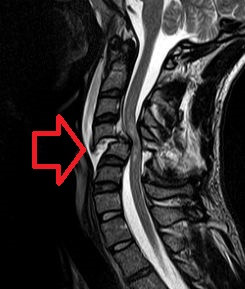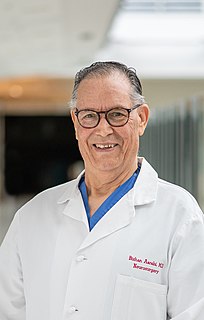Related Research Articles

Michigan Technological University is a public research university in Houghton, Michigan. Its main campus sits on 925 acres (374 ha) on a bluff overlooking Portage Lake. Michigan Tech was founded in 1885 as the first post-secondary institution in the Upper Peninsula of Michigan and was created to train mining engineers to operate the local copper mines. Science, technology, forestry and business have been added to the numerous engineering disciplines, and Michigan Tech now offers more than 130 degree programs through its five colleges and schools. It is classified among "R2: Doctoral Universities – High research activity".
Spasticity is a feature of altered skeletal muscle performance with a combination of paralysis, increased tendon reflex activity, and hypertonia. It is also colloquially referred to as an unusual "tightness", stiffness, or "pull" of muscles.
Tetraplegia, also known as quadriplegia, is paralysis caused by illness or injury that results in the partial or total loss of use of all four limbs and torso; paraplegia is similar but does not affect the arms. The loss is usually sensory and motor, which means that both sensation and control are lost. The paralysis may be flaccid or spastic.

A spinal cord injury (SCI) is damage to the spinal cord that causes temporary or permanent changes in its function. Symptoms may include loss of muscle function, sensation, or autonomic function in the parts of the body served by the spinal cord below the level of the injury. Injury can occur at any level of the spinal cord and can be complete, with a total loss of sensation and muscle function at lower sacral segments, or incomplete, meaning some nervous signals are able to travel past the injured area of the cord up to the Sacral S4-5 spinal cord segments. Depending on the location and severity of damage, the symptoms vary, from numbness to paralysis, including bowel or bladder incontinence. Long term outcomes also range widely, from full recovery to permanent tetraplegia or paraplegia. Complications can include muscle atrophy, loss of voluntary motor control, spasticity, pressure sores, infections, and breathing problems.

A brachial plexus injury (BPI), also known as brachial plexus lesion, is an injury to the brachial plexus, the network of nerves that conducts signals from the spinal cord to the shoulder, arm and hand. These nerves originate in the fifth, sixth, seventh and eighth cervical (C5–C8), and first thoracic (T1) spinal nerves, and innervate the muscles and skin of the chest, shoulder, arm and hand.

The Shirley Ryan AbilityLab, formerly the Rehabilitation Institute of Chicago (RIC), is a not-for-profit nationally ranked physical medicine and rehabilitation research hospital based in Chicago, Illinois. Founded in 1954, the AbilityLab is designed for patient care, education, and research in physical medicine and rehabilitation. The AbilityLab specializes in rehabilitation for adults and children with the most severe, complex conditions ranging from traumatic brain and spinal cord injury to stroke, amputation and cancer-related impairment. Affiliated with Northwestern University, the hospital is located on the Northwestern Memorial Hospital campus and partners on research and medical efforts.
Kookal Ramunni Krishnan born in Kerala, was an Indian physician. He was the former director of Southport Regional Spinal Injuries Centre in Southport, United Kingdom, a lecturer in the department of neurological science at University of Liverpool, and visiting professor of rehabilitation at the University of Salford. He is credited with pioneering the spinal injuries service at Southport.

Central cord syndrome (CCS) is the most common form of cervical spinal cord injury. It is characterized by loss of motion and sensation in arms and hands. It usually results from trauma which causes damage to the neck, leading to major injury to the central corticospinal tract of the spinal cord. The syndrome is more common in people over the age of 50 because osteoarthritis in the neck region causes weakening of the vertebrae. CCS most frequently occurs among older persons with cervical spondylosis, however, it also may occur in younger individuals.
RTI Surgical is a medical technology company that was founded in 1992 as Pioneer Surgical Technology in Marquette, Michigan, United States.
DMC Rehabilitation Institute of Michigan (RIM) is one of the eight hospitals affiliated with the Detroit Medical Center. RIM is one of the largest, academic, rehabilitation hospitals in the United States specializing in rehabilitation medicine and research. RIM offers clinical treatment in spinal cord injury, brain injury, stroke, complex trauma and orthopedics and catastrophic injury care. The institute is home to the Center for Spinal Cord Injury Recovery, a facility designed to implement and study innovative treatments in spinal cord injury recovery.
Kristjan T. Ragnarsson, M.D., is a physiatrist with an international reputation in the rehabilitation of individuals with disorders of the central nervous system. He is currently the Dr. Lucy G. Moses Professor and Chair of Rehabilitation Medicine at The Mount Sinai Medical Center in New York City.
TIRR Memorial Hermann is a 134-bed rehabilitation hospital, rehabilitation and research center, outpatient medical clinic and network of outpatient rehabilitation centers in Houston, Texas that offers physical rehabilitation to patients following traumatic brain or spinal injury or to those suffering from neurologic illnesses. In 2014, U.S. News & World Report named TIRR Memorial Hermann to the list of America's Best Hospitals for the 25th consecutive time.
Stephen Thomas Wegener is an American rehabilitation psychologist specializing in the psychology of pain management. His work seeks to improve function and reduce disability for persons with chronic illness and impairments, including occupational injuries, rheumatic disease, spinal cord injury or limb loss. He also develops cognitive-behavioral therapy and self-management to prevent or mitigate pain associated with disability, and examines psychological variables that can affect positive outcomes.
Sir George Montario Bedbrook, OBE was an Australian medical doctor and surgeon, who was the driving force in creating the Australian Paralympic movement and the Commonwealth Paraplegic Games, and helped to found the FESPIC Games.

Segun Toyin Dawodu is a Nigerian Physiatrist and lawyer with the WellSpan Health, he served as an Associate Professor of Pain Medicine at Albany Medical College.
A catastrophic injury is a severe injury to the spine, spinal cord, or brain, and may also include skull or spinal fractures. This is a subset of the definition for the legal term catastrophic injury, which is based on the definition used by the American Medical Association.
Mary Pauline Galea is an Australian physiotherapist and neuroscientist at University of Melbourne. She resides in Melbourne, Australia. Galea is a professorial fellow at the University of Melbourne's Department of Medicine at the Royal Melbourne Hospital and a Senior Principal Fellow in the Florey Institute of Neurosciences and Mental Health. She was foundation professor of clinical physiotherapy and director of the Rehabilitation Sciences Research Centre at the University of Melbourne and Austin Health. She is internationally recognised for her work in spinal cord injury and rehabilitative interventions.

Although spinal cord injury (SCI) often causes sexual dysfunction, many people with SCI are able to have satisfying sex lives. Physical limitations acquired from SCI affect sexual function and sexuality in broader areas, which in turn has important effects on quality of life. Damage to the spinal cord impairs its ability to transmit messages between the brain and parts of the body below the level of the lesion. This results in lost or reduced sensation and muscle motion, and affects orgasm, erection, ejaculation, and vaginal lubrication. More indirect causes of sexual dysfunction include pain, weakness, and side effects of medications. Psycho-social causes include depression and altered self-image. Many people with SCI have satisfying sex lives, and many experience sexual arousal and orgasm. People with SCI employ a variety of adaptations to help carry on their sex lives healthily, by focusing on different areas of the body and types of sexual acts. Neural plasticity may account for increases in sensitivity in parts of the body that have not lost sensation, so people often find newly sensitive erotic areas of the skin in erogenous zones or near borders between areas of preserved and lost sensation.
Michael Fehlings is a Canadian neurosurgeon based at Toronto Western Hospital in Toronto, Ontario, Canada. Dr. Fehlings specializes in complex spine surgery with a special interest in traumatic and non-traumatic spinal cord injury and spine oncology. He mainly focuses on preclinical and clinical translational research related to enhancing repair and regeneration of the injured central nervous system. He holds many positions, including Head of the Spinal Program at the Toronto Western Hospital, Professor of Neurosurgery at the University of Toronto, Vice Chair Research at the University of Toronto, Halbert Chair in Neural Repair and Regeneration, Scientist at the McEwen Centre for Regenerative Medicine, McLaughlin Scholar in Molecular Medicine, and Co-Director of the University of Toronto Spine Program. He is the past inaugural Director of the University of Toronto Neuroscience Program, and was the previous Medical Director at Toronto Western Hospital. Dr. Fehlings is a Fellow of the American College of Surgeons and a Fellow of the Royal College of Surgeons of Canada.

Bizhan Aarabi is an Iranian-American neurosurgeon, researcher, author and academic. He is Professor of Neurosurgery at University of Maryland and the Director of Neurotrauma at the R Adams Cowley Shock Trauma Center.
References
- ↑ http://www.pioneersurgical.com/about_management.asp?menu=3,0,0,0,%5B%5D
- ↑ Benzel, Edward C. & Tator, Charles H. (2000). Contemporary Management of Spinal Cord Injuries: From Impact to Rehabilitation. Park Ridge, IL: American Association of Neurological Surgeons. p. 166. ISBN 978-1-879284-72-2. OCLC 247971013 – via Google Books.
- ↑ Department of Biological Sciences (2011). "Distinguished Alumni: Matthew Songer". Michigan Technological University. Archived from the original on July 28, 2012. Retrieved December 1, 2008.